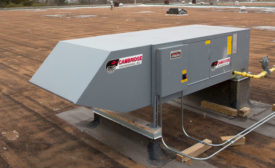- NEWS
- MEDIA
- REFRIGERATION
- BUSINESS 101
- RESIDENTIAL
- COMMERCIAL
- DIRECTORY
- MORE
- INFOCENTER
- MEDIA GROUP
- MAGAZINE
Home » Keywords: » biomass
Items Tagged with 'biomass'
ARTICLES
Lights, pipes, and more reduce environmental impact
Read More
DOE Investment Brings Clean Energy to Federal Facilities
Projects are aimed at increasing solar photovoltaic (PV) and biomass generation
February 12, 2016
Hydronics Zone: The Evolution of Biomass Boilers
Combining biomass-fueled boilers and modern hydronics to form an efficient system
Read More
MassCEC Announces $30 Million in Funding for Clean Heating and Cooling Rebates
Provides rebates to home and business owners who install high-efficiency clean heating and cooling
September 22, 2015
Renewable Energy’s Share of US Energy Consumption Highest Since 1930s
Renewable energy use grew an average of 5 percent per year over 2001-2014
June 11, 2015
Organizations Explore Biomass
Biomass Studied for Inclusion in Co-sponsored Green Building Standard
March 9, 2015
Feb. 17, 2015: ASHRAE/USGBC/IES to Develop Biomass Requirements for Green Building Standard
Committee Intends to Work on a Definition of Biomass as Well as Requirements on the Use of Biomass
February 17, 2015
Hurst Boiler Selected for Biomass District Energy Project
Sullivan County, N.H., Sees Immediate Economic and Environmental Benefits
December 29, 2014
Dec. 22, 2014: Hurst Boiler Selected for Biomass District Energy Project
Sullivan County, N.H., Sees Immediate Economic and Environmental Benefits
December 22, 2014
EVENTS
Training Track
4/10/14
Westin Portland Harborview Hotel
157 High St.
Portland, Maine
Hydronics for High Efficiency Wood-fired and Pellet-fired Boilers
Copyright ©2025. All Rights Reserved BNP Media.
Design, CMS, Hosting & Web Development :: ePublishing






